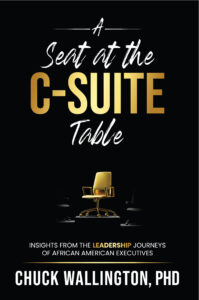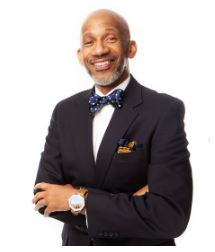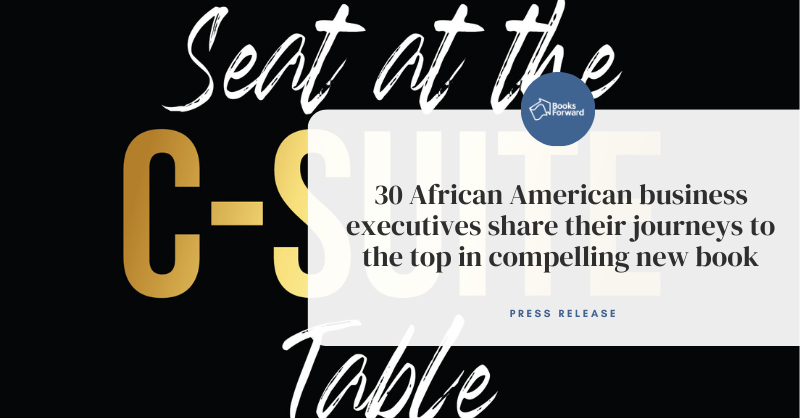 GREENSBORO, North Carolina – Releasing just ahead of Black History Month, Dr. Chuck Wallington’s new book, “A Seat at the C-Suite Table: Insights from the Leadership Journeys of African American Executives” (Business Expert Press, Jan. 19, 2024), shares the often-overlooked experiences of black men in business.
GREENSBORO, North Carolina – Releasing just ahead of Black History Month, Dr. Chuck Wallington’s new book, “A Seat at the C-Suite Table: Insights from the Leadership Journeys of African American Executives” (Business Expert Press, Jan. 19, 2024), shares the often-overlooked experiences of black men in business.
“A Seat at the C-Suite Table” is an insightful look at the leadership journeys of 30 African American male C-Suite executives. In their own compelling words, executives describe earning and maintaining a seat at the C-Suite table. They speak candidly about how the lack of mentors, coaches, and role models impacted but did not stop them. They talk openly about navigating corporate settings designed years ago by White men. They speak freely about their commitment to supporting the next generation of leaders.
This book was inspired by data suggesting that there is racial/ethnic underrepresentation in corporate leadership roles in the United States. This underrepresentation ranges from the presidency of colleges and universities to the U.S. Senate to corporate boardrooms. This book provides advice, hope, and inspiration for others. It also includes a road map for all leaders who desire to become better mentors, coaches, sponsors, and allies for current and future underrepresented leaders.
“A Seat at the C-Suite Table: Insights from the Leadership Journeys of African American Executives”
Chuck Wallington, PhD | January 19, 2024 | Business Expert Press | Business
Paperback | ISBN: 987-63742-555-8
Ebook | ISBN: 987-6342-556-5

Charles F. (Chuck) Wallington is a C-Suite executive and a chief marketing and communications officer. For the past 12 years, Chuck has held leadership roles in the healthcare industry. Previously, he held leadership roles in the financial services and the consumer-packaged goods industries.
After a brief stint as a newspaper reporter, the University of North Carolina Journalism School graduate segued into public relations and marketing where he has been blessed to enjoy a successful career. He later earned a master’s in communications management from the S.I. Newhouse School of Public Communications at Syracuse University. His master’s research, titled “Barriers, Borders and Boundaries: Exploring why there are so few African American men in the public relations profession,” was named one of the Top 15 Public Relations Insights of 2020 by the Institute of Public Relations.
Chuck also earned his PhD in Leadership Studies from North Carolina A&T State University. His 2021 dissertation, Navigating the C-Suite: Exploring the Leadership Journey of African American Male Executives in U.S. Corporations, inspired this book.
Follow Chuck Wallington on Twitter @CFWallingtonPhD
In an interview, Chuck Wallington can discuss:
- His process for interviewing the 30 executives featured in “A Seat at the C-Suite Table”
- The commonalities shared among the diverse group of executives, and where they differ in their respective journeys
- His own experiences as an African American male executive, and how he can identify with the joys and pains of journeys shared by the executives featured in his book
- How faith has played and continues to play a role in his educational and career trajectory
- His background in journalism and how it helped him conduct interviews for this book – with a focus on learning from and sharing the lived experiences of the executives featured in his book
- How other black male executives paved the way for those featured in his book
- What he hopes for the next generation of black executives
An Interview with
Chuck Wallington
What called you to write this book?
As I was completing the writing of my dissertation, one of my committee members encouraged me to convert my dissertation into my book. When she mentioned it, I laughed and I thought to myself, “All I’m trying to do is successfully defend and graduate.” After successfully defending, the same committee member encouraged me, again, to convert the dissertation into a book. She then connected me with an editor and a publisher. The rest, as they say, is history. I soon became very motivated to share the stories of these 30 accomplished African American executives whose journeys to the C-Suite are fascinating! I hope that sharing their stories in this book is a way for others to learn from and be inspired by their journeys. This includes the next generation of African American male C-Suite leaders.
Can you take us through your methodology for researching and how you decided which executives to feature?
I used qualitative research methodology to gather the data for the book. With qualitative research, “words” are your data. Within qualitative research methodology, I then employed a “snowball sampling” technique. This simply means that I reached out to the four or five African American C-Suite leaders whom I knew, and I asked them to allow me to interview them. Fortunately, they all said yes. I then asked them to connect me with others. And, they did.
I also relied on people within my network (family, friends, colleagues) to connect me with African American executives whom they knew. Fortunately, the connections began to “snowball” and I identified and interviewed an additional 25 men to get to my goal of 30 African American male C-Suite executives.
Even though you included interviews from a diverse group of executives, there were commonalities shared among them. Can you expand on that?
From my interviews with 30 African American male C-Suite executives, five themes emerged: the importance of the pursuit of goals, the impact of relationships to their success, the importance of being a servant leader, the challenges of being an African American male and the impacts to U.S. corporations that do not have strong representation of African Americans in their leadership ranks.
How did you own experiences as an African American male executive impact your approach to this book? While you surely had a lot in common with them – sharing the joys and pains of their career journeys – was there anything that surprised you or something you didn’t expect to learn while interviewing the subjects in your book?
I was very careful not to let my own lived experiences impact the research. For example, when interviewing each of the executives, I “stuck to the script.” In other words, I didn’t react to any of what they shared, even though I could relate to a lot of it. This is where my training as a reporter paid off. I was taught to ask the right questions and not to insert myself into the story. That’s what I did in conducting the research for this book.
I was surprised that one executive said he was not aware of the gap in the number of African American males in C-Suite roles.
What role has faith played in your educational and career decisions?
My faith is at the core of who I am and the decisions that I make. I’ve learned the hard way that when I don’t rely on my faith and on a higher-power, I make mistakes. My faith was the foundation for me returning to school later in life to earn my Master’s and my Ph.D.
Being a person of faith in business can sometimes be difficult, especially as you face stigmas and ethical decisions. Can you discuss how your faith continues to impact your daily work?
I draw on my faith for guidance on how to handle all kinds of situations in the workplace. This includes everything from business challenges to “people” challenges. I often say to myself, “Lord, I’m about to open my mouth. Please speak for me.” Or, I’ll say to myself, “Lord, I have no idea how to handle this situation. Please show me what to do.” Fortunately, He answers my prayers.
You also discuss faith with some of the executives featured in the book. How did their faith impact their life decisions? How do they maintain their faith even in potentially difficult situations?
Several of the executives mentioned the importance of their faith. Specifically, they talked about how their faith sustained them during the most challenging times of their careers. Many of them acknowledged that without their belief in a higher power they would not be successful in the roles that they’re in today.
If you’re willing, we’d love to hear more about how your personal relationship with your wife informed your business and career decisions. She seems like a true partner in life and in business.
My wife is my #1 fan and cheerleader. And, she also insists that I take the trash cans to the street every Monday evening for pickup early Tuesday morning. She keeps me grounded in the things in life that are important. She’s a great person to dream big dreams with. And, she’s also the important “voice of reason” along the way. I’m blessed to be able to “do life” with her.
You studied journalism at some of the best collegiate programs in the country. Your book also focuses on learning from and sharing the lived experiences of the executives featured in his book. How did your journalism training help your research and writing process?
I’m proud of my journalism education from the University of North Carolina at Chapel Hill (undergraduate) and Syracuse University (graduate). My undergraduate training at UNC instilled in me the fundamentals of journalism (asking the right questions, knowing how to write, keeping myself out of the story, developing relationships with trusted sources). My graduate training at Syracuse taught me how to combine what I learned as an undergraduate with what I had learned throughout my career about the importance of also being a strategic thinker and a strategic, collaborative thought partner. Each day I rely on what I learned at both schools in the workplace and in life.
Can you describe the challenges of the black executives that came before you — and the ways in which they paved the way for you and those you interviewed for the book? What don’t most people understand about their experiences and how they helped the next generation? Is there anything overlooked?
Generally speaking, the African American executives who paved the way for me and others had it hard. They were the only people of color in their workplaces. They had no systems of support to ensure their success. Because there were few, if any, role models, mentors or allies who looked like them, they had to figure everything out. This includes deciphering the corporate and organizational culture and structure which was not designed for their success. Sadly, African American executives today face many of the same challenges, as described by the men featured in this book.
What challenges did you face that you hope the next generation can avoid?
I face many of the same challenges as the executives on whose shoulders I stand. I’ve only had one or two mentors in my entire corporate career. I’ve also had relatively few role models – men who look like me who do what I do for a living. I’ve had to figure things out, primarily by listening, observing and learning from others. I hope that the next generation can avoid this experience.
What do you hope for the next generation of black executives?
I hope that the next generation of African American leaders will have people who look like them (as well as those who don’t) who will embrace them for who they are, will provide coaching, mentoring, and sponsorship opportunities so that they can be successful in the pursuit of their wildest dreams.
What advice do you have for the next generation?
- Continue to study and prepare yourselves for the work to which you’ve been called – professionally and personally.
- Surround yourselves with people who will support and will challenge you. This includes people who will tell you what you don’t want to hear but need to hear. This is where growth occurs.
- Keep the faith. If it’s meant to be, God will work it out on your behalf.

A former award-winning journalist with national exposure, Marissa now oversees the day-to-day operation of the Books Forward author branding and book marketing firm, along with our indie publishing support sister company Books Fluent.
Born and bred in Louisiana, currently living in New Orleans, she has lived and developed a strong base for our company and authors in Chicago and Nashville. Her journalism work has appeared in USA Today, National Geographic and other major publications. She is now interviewed by media on best practices for book marketing.

